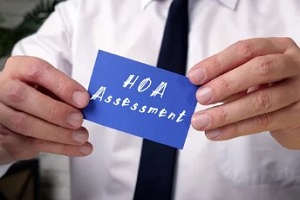 Living in a homeowners association provides numerous benefits, and for some people, these advantages are the determining factor when deciding where to purchase a home. HOAs offer consistent aesthetics that ensure a participating neighborhood looks beautiful and remains free of issues such as unsafe communal spaces.
Living in a homeowners association provides numerous benefits, and for some people, these advantages are the determining factor when deciding where to purchase a home. HOAs offer consistent aesthetics that ensure a participating neighborhood looks beautiful and remains free of issues such as unsafe communal spaces.
Additionally, the community typically has access to public areas such as parks, pools, and other amenities that are funded through HOA special assessments that each household pays. However, sometimes an extenuating circumstance can necessitate more money than what the HOA board has available.
In these situations, the governing body may levy a special assessment to cover costs. For those considering living in an HOA, or for homeowners who want to be prepared for a special assessment in the future, it is important to understand how they work and how to navigate them.
Here is an overview of California special assessments in homeowners associations, types of situations that qualify, and what to do if the HOA oversteps its bounds.
What Is an HOA Special Assessment?
All homeowners who live in an HOA neighborhood will pay dues, which are fees that the governing body uses to help with general community upkeep. However, in certain situations, the HOA leadership may send a bill for an additional amount above the standard dues.
Each household is responsible for paying this extra bill, though many HOAs will offer payment plans or an extended deadline. Special assessments are not a standard part of living in an HOA, but they are a possibility during financial emergencies.
When Can a California HOA Impose Special Assessments?
Special assessments are only legal for the purposes of covering the cost of unexpected and critical repairs. For example, if lightning severely damages the community center in a California HOA neighborhood, the governing body may levy a special assessment to recover the funds necessary to rebuild this structure.
 One of the main rules governing special assessments is that the repair needs to impact the community at large. A special assessment will focus on communal structures and will only occur in times of crisis or large and unexpected issues.
One of the main rules governing special assessments is that the repair needs to impact the community at large. A special assessment will focus on communal structures and will only occur in times of crisis or large and unexpected issues.
All other repairs are expected to be funded using the HOA’s reserve funds, which are accumulated over time from the regular dues paid by the association residents.
What Types of Projects Don’t Qualify
Homeowners associations are limited in the types of projects for which they may levy a special assessment.
For instance, if the garage of one resident is destroyed in a storm, this might be considered a catastrophic incident in need of repair—but it is not the responsibility of the community, and it does not impact community property. Thus, a special assessment cannot be used to pay for repairs, and the homeowner would be responsible.
Additionally, California places limits on what is considered an emergency. HOAs are expected to keep public areas in good repair over time. If the roads are private and full of potholes because the HOA has not been managing its money properly, this is not considered an emergency in the same way that an earthquake would be if it destroyed a road.
Additional Rules Regarding HOA Special Assessments
When homeowners receive special assessments, they may be nervous about the possibility of facing high bills that they could not have predicted. However, additional rules governing special assessments prevent this concern.
 In California, a special assessment may not exceed 5% of the total fiscal year’s budget. If the HOA budgeted $100,000, then it may only collect $5,000 in special assessment fees, an amount that is distributed evenly among all residents. Each resident will only pay a portion of the $5,000, rather than each resident paying $5,000.
In California, a special assessment may not exceed 5% of the total fiscal year’s budget. If the HOA budgeted $100,000, then it may only collect $5,000 in special assessment fees, an amount that is distributed evenly among all residents. Each resident will only pay a portion of the $5,000, rather than each resident paying $5,000.
If the community collectively agrees by vote to pay more in order to fund a large project, this is permissible in California. However, a majority of a quorum must vote in favor of this decision; an HOA is not permitted to demand a super-majority or any other voting structure.
Seek Legal Help for HOA Disputes in California
HOAs can leverage special assessments to accomplish important goals for their communities. Unfortunately, there are some that may also abuse their power by demanding special assessments in situations that do not qualify or billing for an amount higher than what is legal in California.
If you are facing a dispute with an HOA over special assessments or another issue, it is important to seek legal help. The attorneys at Lehr Law have helped residents fight for their rights in their HOA living situations. Contact Lehr Law to schedule a consultation.
